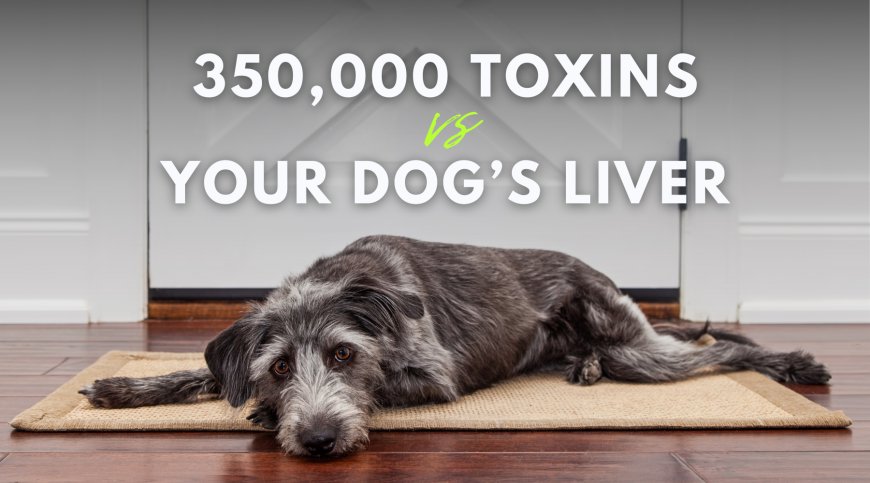350,000 New Toxins vs. Your Dog's Liver
Why is your dog's liver crucial for overall health? And why is liver disease is on the rise? Learn how the increase of environmental toxins and chemicals is affecting liver function and what you can do to safeguard your pet's well-being.More

Your dog’s liver is busy
This vital organ impacts more than 500 metabolic functions in your dog’s body including detox, energy and hormone management, protein and fat management, blood clotting, vitamin production and much more.
Simply put, your dog can’t be healthy without a healthy liver, which is becoming increasingly rare.
The incidence of liver disease is rising rapidly in dogs and people.
It’s more important than ever before to protect and care for our dogs’ and our own liver health.
Why are more and more dogs and humans struggling with poor liver health and liver dysfunction? Well…
Because our world is an increasingly toxic place -- and the problem is a lot worse than most people realize.
Let me show you what I mean:
Last year, a group of scientists published a study showing that a staggering 350,000!!!! new toxic chemicals have entered the environment over the past 4 decades.
In addition, about 700 new toxic chemicals are added to the US Toxic Substances Control Act per year.
Think about that…
What that means is that, at a rate of about 2 new chemicals per day, a toxic pesticide, emulsifier, preservative, additive, or other substance is being used by industry and entering our environment.
Once these chemicals enter the environment it’s only a matter of time before our dogs get exposed to them.
Take glyphosate, for example.
As you may know, glyphosate is a weed killer and the main ingredient in Roundup, the most widely used herbicide in the world.
Recently, a team of America’s top scientists identified glyphosate as a major cause of oxidative stress.
Oxidative stress damages your cells, proteins, and DNA, which makes us and our dogs age faster.
It triggers brain fog, poor focus, and memory problems.
Oxidative stress is also a major cause of liver disease, liver enzyme elevation, and poor liver function.
If you follow health news, you may know that glyphosate has been detected in many foods, such as cereal, bread, pasta, meat, fruits and vegetables, and even drinking water!
And unfortunately, glyphosate has been found in dog food, too.
Where do we go from here?
The truth is, we can’t do much about the constant presence of toxins in our world, but we can love and support our dogs and our own bodies by paying attention to liver support and detox.
This relentless exposure to chemicals, heavy metals, food additives and other toxins puts tremendous pressure on the health and function of our dogs’ livers.
So that’s a big reason why many dogs today are struggling with compromised liver health.
The good news is, that there’s a lot you can do to protect and care for your dog’s liver health.
-
Detox: In the past, I recommended doing a detox with LiverTune twice per year.
But recently, I’ve been doing additional work on dosing protocols, considering feedback and results, and also my own use of the product.
I concluded that it would be more beneficial to give LiverTune for one week each month to provide even more liver protection and overall health support.

- Bloodwork: Sometimes even healthy dogs may have elevated liver enzymes (ALT) without necessarily suffering from liver disease.
- Avoid prescription diets: Feeding a raw or gently cooked diet cures many ailments, and also helps dogs with liver disease.
-
Read more on how to protect your dogs liver by clicking the link below.
The Ultimate Liver Health Guide for Dogs (complete step-by-step)
References
1. Muir DCG, Getzinger GJ, McBride M, Ferguson PL. How Many Chemicals in Commerce Have Been Analyzed in Environmental Media? A 50 Year Bibliometric Analysis. Environ Sci Technol. 2023 Jun 27;57(25):9119-











































